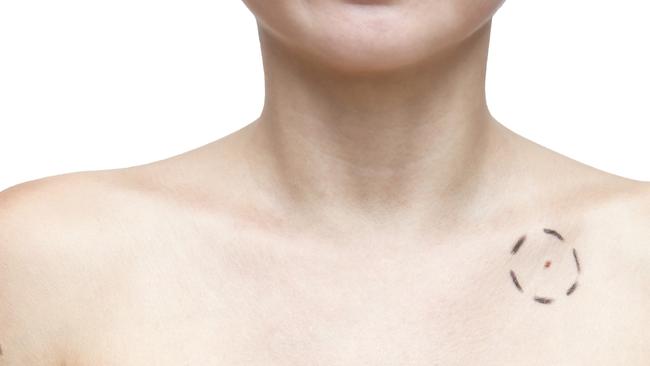Clinuvel’s drug to stop patients with rare genetic condition developing skin cancer passes phase 2 trials
After three years of clinical studies, Clinuvel has shown its drug afamelanotide can shield patients with xeroderma pigmentosum from developing skin cancer.

Business
Don't miss out on the headlines from Business. Followed categories will be added to My News.
ASX-listed biotech Clinuvel has successfully completed a phase two trial on a drug aimed at protecting patients living with a rare genetic disorder from developing skin cancers, allowing them to potentially venture outdoors.
The study evaluated Clinuvel’s drug afamelanotide to treat xeroderma pigmentosum (XP), which forces those with the condition to “live in the dark”, given their heightened risk of developing aggressive skin cancers when exposed to sunlight.
The disorder affects about one in one million people, affecting their ability to repair DNA damage from UV rays. They have a 1000-fold increase in developing skin cancer, with a median life expectancy of about 30 years.
But Clinuvel genomic scientist Jessica Nucci said the phase two trial – the first in the world to expose XP patients to a novel therapy – showed afamelanotide could reduce that DNA damage.
It comes as local biotechs are back on the world stage, with the biggest Australian delegation since the Covid-19 pandemic descending on JP Morgan’s major health conference in San Francisco – setting up for a year of deal making.
“XP patients are known as ‘children of the moon’ due to their need to avoid any light and sun exposure or risk severe, aggressive skin cancers from an early age,” Dr Nucci said.
“With great enthusiasm, and most of all to the satisfaction of XPC patients, we have learned for the first time that afamelanotide provides assisted DNA repair by reducing photoproducts and decreasing the risk factors of skin cancer development.
“These results are exciting as the findings may be translated to wider populations who are at higher risk of skin cancer due to DNA damage, such as those who are immunosuppressed or with fair skin, blue eyes and fair hair.”
Clinuvel shares advanced 1.4 per cent to $24.95 on Monday. This added$17.3mto its a market value of $1.24bn, and compared with a 0.8 per cent gain across the broader sharemarket.

Clinuvel started clinical trials of afamelanotide in XP patients in 2020, aiming to assess whether treatment with the drug could safely reduce the number of photoproducts – breakages in the DNA helix known as CPDs – as well as showing improvement in other markers of skin damage.
The phase trial ran for 10 weeks, with a six-month follow-up. Patients were administered six doses of afamelanotide as well as controlled UVB radiation on unexposed areas of the skin. Results from the first three XP patients treated showed a reduction in CPDs, particularly at deeper levels of the skin, as well as a decrease in sunburn, under “controlled laboratory conditions”.
“Although a small sample for now, in many ways this is an immense clinical step forward in systemic photoprotection and addressing photodamage of the skin. We are all very much looking forward to the data from other XP patients to speed up the extension of commercial use of this drug for untreated patients,” Dr Nucci said.
“In the immediate term, we have multiple studies of afamelanotide ongoing, which may provide greater evidence of the potential of the drug to assist DNA regeneration in both XP patients and disease-free subjects.”
More Coverage
Originally published as Clinuvel’s drug to stop patients with rare genetic condition developing skin cancer passes phase 2 trials





